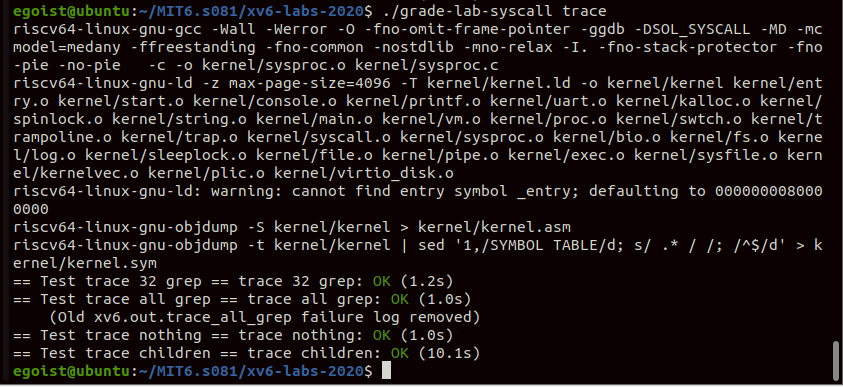MIT6.S081 Lab2
System Calls(pending the challenge)
In the lab, we will get deeper into OS than the previous one. We are about to implement the ‘bridge’ between user and kernel mode, then implement two specific syscall to be called by user’s program.
Lab
The two labs are symmetry overall, so I just describe how to do a system call.
To make our own syscalls,we should know how the syscall works between user & kernel mode.
1 | user function |
In this framework, there are some points:
- How to use ecall?
- We first declare a wrapped function in
user/user.h, then implement it inuser/usys.Swhich are assembly code generated byuser/usys.pl, the assembly code are used to load the syscall number intoa7register.
- We first declare a wrapped function in
- In kernel mode how to fetch argument?
- Refer to other functions in
kernel/sysproc.c, we can useargint()inkernel/syscall.cto fetch argument from stack
- Refer to other functions in
- syscall() in
kernel/syscall.c, what’s its function?- It precedes after ecall, fetches the
a7then executes corresponding syscall, then put the return value intoa0
- It precedes after ecall, fetches the
Trace
Remember to put your new syscall number into every part a syscall can involve with, especially don’t forget set the function point entry in
syscall.c‘s array.The function uses mask to mark all system call it wants to trace, so each bit on mask is a syscall you should check. Use
mask & 1 << syscallnumto check it.

Sysinfo
- The way kernel mode gives back argument to user mode is to call
copyoutwhich maps return args’ virtual memory back to physical memory then revises it to target value. - The collections of free memory and processes is not too hard, we can just iterate the freemem linklist and process array.

Conclusion
In this lab, we breakthrough the barrier between u/k mode, the whole detailed system call process is in front of us. But there are still many information we need to get into, mmap, pages management , process management, etc.
Also, I have not started challenges, because I am about to begin my graduate life in NUS, hopefully I can go back here and finish them someday!

